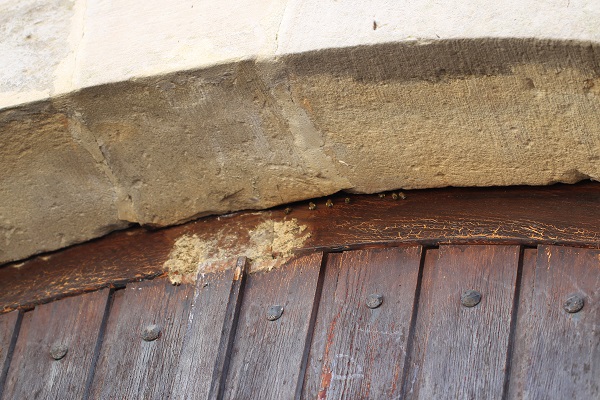 Free-living bees in a building;
Credit: Honey Bee Wild
Free-living bees in a building;
Credit: Honey Bee Wild
Honey Bee Wild (HBW), a European citizen science project funded by Luxembourg's National Research Fund (Fonds National de la Recherche - FNR), has relaunched its request for the public to inform its volunteers of the presence of wild honey bees.
HBW is once again calling on members of the public to help it locate free-living honey bees (i.e. honey bees living without humans) in natural and human-made cavities, such as in trees and buildings. The project aims to identify and monitor these nests of wild honey bees, one of Luxembourg's most useful but most threatened insects, to determine the average number of years that they survive.
Whilst bees are best known and appreciated for their honey and pollen, they also have a very important role to play in the ecosystem as pollinators and their absence has a profound impact on flora and fauna diversity and ultimately on the food chains that we rely on.
Like most flying insects, honey bees are in decline for a number of reasons, including habitat loss, the use of pesticides, pathogens and parasites. To address some of these threats, there are selective breeding programmes to improve their resilience. However, for the sake of the longevity of the species, honey bees also need to evolve on their own, without human intervention, adapting to environmental changes as they have for millions of years. The surviving bees will have desirable genetics and hence be able to increase the genetic diversity of the species to ensure its long-term survival.
Since you can only protect what you know to be out there, HBW wishes to study and support the wild populations of honey bees in Luxembourg, for which there are still many knowledge gaps, both in terms of their distribution and abundance and in their interactions with other species. By studying the conditions for survival of free-living bees, citizen scientists gain an understanding of how humans interact with other species and the need to protect wildlife.
Anyone who knows of or comes across wild honey bee colonies living in a tree, building or other structure is asked to inform the group via email: honeybeewildlux@gmail.com, via tel. (mobile / GSM / WhatsApp / Signal): 621-554515 or by using the hashtag #freelivingbeeslux on Facebook, Instagram and Twitter.
Members of the public are also invited to create an account on iNaturalist, join this project and upload their photo(s) to www.inaturalist.org/projects/free-living-bees-luxembourg.
About HBW
Honey Bee Wild volunteers have created natural habitat for honey bees in logs and now, with the public's help, they wish to identify and monitor free-living honey bees living in natural and human-made cavities to determine their average lifespan. The group of volunteers is composed of Dave Burke, Roger Dammé, Annemie Debackere, John Park, Hannah Proffitt-Perchard, Carmen Schmitz, Amanda Surbey, Michel Wilwert and Christian Zewen.








